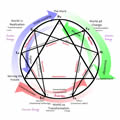Sometimes Reasoning Can Be Simple
2015-01-18
Sometimes reasoning does not have to be some big, earthshaking process to be profound. Case in point is something that happened earlier today.
I’ve been trying to learn how to speak Hebrew, and have felt some frustration because normal written Hebrew doesn’t include vowels. These “vowels” are not letters as in English, but rather they are (usually) small makings or “pointings” called nikud. Or rather they would be small markings if they were normally included, which they aren't. Of course, just to add to the confusion, sometimes these vowels actually do come in the form of a written letter. But without the nikud, it’s very difficult for someone learning the language to ‘guess’ whether they are seeing a vowel or a consonant.
Now add to this challenge the fact that different vowels are pronounced pretty much the same way. I have one book that says the vowel “Patach” should be pronounced like “a as in yacht’. And the vowel Kamets should be pronounced like… you guessed it, like “a as in yacht”. And yet some people and books seem to be able to detect a difference.
According to my unexamined assumptions, since spoken Hebrew was only revived in the 19th and early 20th century, probably no one knew how to pronounce the subtle vowel sounds, therefore all this talk (no pun intended) about subtle differences was no doubt unfounded.
Enter the reasoning process using our four steps…
My situation: I’m complaining to my Hebrew speaking partner that all this emphasis on subtle vowel sounds was misplaced because of the century’s long gap in Hebrew being used as a cultural language, (IMHO) no one really knows how these vowels are pronounced.
The reasoning process: After making clear my objections, she points out that spoken Hebrew was in fact preserved in the prayers and traditions of Jewish culture.
The outcome: Hmmmm, I hadn’t thought of this possibility, and I had to admit that I was wrong about my initial assumptions, and therefore wrong about how I saw the situation.
What I learned: It was a bit of a shock to see how I had misjudged the situation, especially since I was so sure of my starting assumptions and logic. This made me wonder how many other situations that I’m quite sure I see correctly also start off with flawed assumptions.
- John Hutcherson's blog
- Log in to post comments
